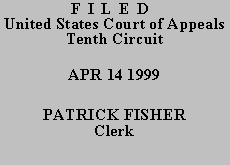

| ARTHUR J. ABELL, JR.,
v.
BRUCE BABBITT, Secretary,
Department of the Interior and
ROGER KENNEDY, Directo |
No. 98-2315
(D.C. No. CIV-95-942-JC) |
I
In 1991 and 1992, Abell filed grievances with NPS against four of his supervisors for failure to evaluate his performance and offer him a permanent promotion. His relationship with his supervisors subsequently deteriorated, leading to his suspension for five days in November 1992. Abell then filed two Equal Employment Opportunity ("EEO") grievances in January 1993, alleging discrimination based on age and race.
After he received a second suspension in February 1993 and notification from NPS that he would be terminated in May 1993, Abell filed another EEO complaint in May 1993, alleging that his imminent termination was in retaliation for his previous complaints. He was terminated a month later. Abell then filed suit in district court in 1995 alleging violations of the ADEA and Title VII.
Even construed liberally, as we must do with pro se litigants, see Hughes v. Rowe, 449 U.S. 5, 9-10 (1980), Abell's brief provides neither a legal nor factual basis for reversing the district court's grant of summary judgment to NPS. He identifies no evidence in the record to show that employees who were either younger or of a different race or sex received favorable treatment from his employer. See Beaird v. Seagate Tech. Inc., 145 F.3d 1159, 1165 (10th Cir.), cert. denied, 119 S. CT. 617 (1998) (citing Ingels v. Thiokol Corp., 42 F.3d 616, 621 (10th Cir. 1994)) (holding that plaintiff in discrimination case can show employer's intent to discriminate against member of protected class through circumstantial evidence of less favorable treatment).
Furthermore, the district court correctly found that even if Abell had established a prima facie case of age, sex, or race discrimination, he failed to rebut appellees' evidence of legitimate, nondiscriminatory reasons for their actions. See Randle v. City of Aurora, 69 F.3d 441, 451 (10th Cir. 1995). Because we agree with the district court's findings and reasoning, and because appellant gives us no reason to hold otherwise, we affirm the dismissal of his ADEA and Title VII claims of age, sex, and race discrimination.
The district court also summarily dismissed Abell's Title VII retaliation claim because he neither presented direct evidence that his suspension and termination in 1993(1) were in retaliation for his protected opposition to Title VII discrimination or participation in a Title VII proceeding, nor established an inference of retaliation. Abell did show that NPS terminated him one month after he filed his EEO complaint alleging discrimination. "We have recognized that protected conduct closely followed by adverse action may justify an inference of retaliatory motive." Marx v. Schnuck Markets, Inc., 76 F.3d 324, 329 (10th Cir. 1996). But we have also said that where discipline had begun prior to protected action, further disciplinary action "simply completed the disciplinary process already set in motion," and does not necessarily lead to an inference of retaliatory motive. Morgan v. Hilti, Inc., 108 F.3d 1319, 1324 (10th Cir. 1997). In rejecting Abell's retaliation claim, the district court found that his termination was a culmination of disciplinary actions that NPS had initiated against him before his initial EEO filing. Because Abell again fails to challenge the district court's careful findings and reasoning, we affirm.
III
Appellant argues that the district court abused its discretion in allowing six successive attorneys to withdraw from representing him. "The grant or denial of an attorney's motion to withdraw in a civil case is a matter addressed to the discretion of the trial court and will be reversed on appeal only when the trial court has abused its discretion." Washington v. Sherwin Real Estate, Inc., 694 F.2d 1081, 1087 (7th Cir. 1982). The record before us shows that in seeking to withdraw, at least three of appellant's former attorneys cited either irreconcilable differences with their client or their inability to advance his claims against NPS in good faith. Their withdrawal caused delays that affected both parties as well as the court. Other than his generalized complaints of prejudice, Abell fails to provide any evidence or make any legal argument to support his claim that the district court abused its discretion in allowing counsel to withdraw their representation.
We review the denial of appellant's motions to compel discovery and extend the discovery deadline for abuse of discretion. See GWN Petroleum Corp. v. OK-TEX Oil & Gas, Inc., 998 F.2d 853, 858 (10th Cir. 1993). The record shows that both Abell and NPS complained to the district court that the opposing side was delaying the discovery process. Abell makes generalized claims of prejudice that we conclude are without merit. He also argues that NPS should have provided him with twenty affidavits from its employees that NPS attached to its motion for summary judgment. These affidavits are not part of the discovery process, and are protected by the attorney-client and attorney work product privileges. Moreover, Abell fails to explain why he could not depose these witnesses himself. Having reviewed the record, we conclude that the district court did not abuse its discretion in denying Abell's discovery request.
For these reasons, we AFFIRM.
The mandate shall issue forthwith.
ENTERED FOR THE COURT
Carlos F. Lucero
Circuit Judge
*.The case is unanimously ordered submitted without oral argument pursuant to Fed. R. App. P. 34(a)(2) and 10th Cir. R. 34.1(G). This order and judgment is not binding precedent, except under the doctrines of law of the case, res judicata, and collateral estoppel. The court generally disfavors the citation of orders and judgments; nevertheless, an order and judgment may be cited under the terms and conditions of 10th Cir. R. 36.3.
1.The district court found that Abell did not allege age, sex, or race discrimination allegations in any of his pre-1993 grievances. Therefore, the court concluded, only those adverse employment actions occurring on or after his initial EEO complaint on January 29, 1993, were relevant under Title VII.